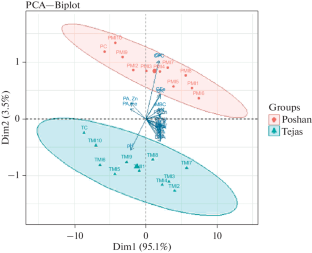Applied Biochemistry and Microbiology ( IF 0.8 ) Pub Date : 2024-04-21 , DOI: 10.1134/s0003683824020169 B. Roy , N. Raghavendra , N. Gupta , A. Nighojkar

|
Abstract
The current study was conducted to isolate, characterize and reveal the impact of native soil microorganisms on durum wheat cultivars (Tejas and Poshan). Three isolates, Candida tropicalis (PY1), Actinomucor elegans (PT1) and Delftia lacustris (IS5) were identified on the basis of cultural characteristics and gene sequencing. Strains possessed multiple plant growth-promoting traits (phytohormones, extracellular enzymes, siderophores and mineral solubilization). Isolates (IS5, PY1, PT1, MDRS14 (Bacillus aryabhattai) and MDSR34 (Bacillus endophyticus) were co-cultured and confirmed to be compatible. The microcosm experiment was conducted with microbial inoculant treatments MI1–MI10, under factorial randomized complete block design with three replications. When compared to the uninoculated control, inoculation of PT1+IS5 in Poshan and MDSR14+MDSR34 in Tejas significantly enhanced the rhizosphere soil characteristics, soil nutrient content, grain nutrient, crop growth parameters, crude protein content, and grain yield for 27.1 and 28.1% in Poshan and Tejas, respectively. On contrary, the phytic acid/Zn (<15) and Fe (<10) decreased in both cultivars. The principal component analysis showed MI5, MI6, MI7, MI8 microbial inoculant treatments to be better for Poshan and MI7 and MI8 for Tejas. Cluster analysis confirmed seed inoculation of culturable microbial strains (MDSR 14 + MDSR 34 and PY1 + PT1) performed better in both cultivars and, thus, have the potential to be exploited as broad-spectrum biofertilizers for durum wheat. The strategy utilizing these isolated microorganisms could be vital to boost durum wheat yield and can be recommended to improve the wheat productivity.
中文翻译:

植物促生长微生物的分离及其对硬粒小麦生长和产量的影响
摘要
目前的研究旨在分离、表征和揭示本土土壤微生物对硬粒小麦品种(Tejas 和 Poshan)的影响。根据培养特征和基因测序,鉴定出三种分离株:热带假丝酵母(PY1)、线虫放线毛霉(PT1) 和湖代尔夫特菌(IS5)。这些菌株具有多种植物生长促进特性(植物激素、胞外酶、铁载体和矿物质溶解作用)。分离株(IS5、PY1、PT1、MDRS14(Bacillus aryabhattai)和 MDSR34(Bacillus endphyticus)进行共培养并确认它们是相容的。微观实验是在析因随机完全区组设计下使用微生物接种处理 MI 1 – MI 10进行的与未接种对照相比,接种PT1+IS5的波山和MDSR14+MDSR34的Tejas显着提高了根际土壤特性、土壤养分含量、籽粒养分、作物生长参数、粗蛋白含量和籽粒产量。 Poshan 和 Tejas 分别降低了 27.1% 和 28.1%,相反,两个品种的植酸/Zn (<15) 和 Fe (<10) 均下降。主成分分析显示 MI 5、MI 6、MI 7、MI 8 。微生物接种处理对于 Poshan 更好,MI 7和 MI 8对于 Tejas 更好。聚类分析证实,可培养微生物菌株(MDSR 14 + MDSR 34 和 PY1 + PT1)的种子接种在两个品种中表现更好,因此有潜力。可用作硬粒小麦的广谱生物肥料。利用这些分离的微生物的策略对于提高硬粒小麦产量至关重要,并且可以推荐用于提高小麦产量。



























 京公网安备 11010802027423号
京公网安备 11010802027423号